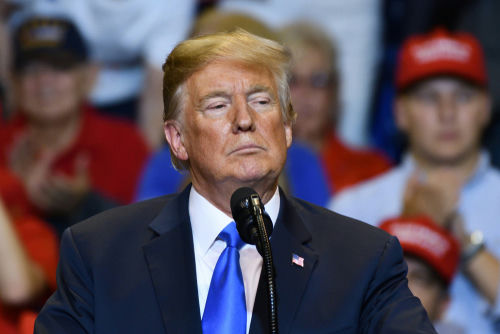After years of rising crime and failed local leadership, President Trump’s unprecedented federal takeover of D.C. policing has reignited the fight to protect American families—and exposed just how far local officials will go to defend their broken status quo.
Grieving Mother Demands Accountability and Action
Tamara Jachym, the mother of Eric Tarpinian-Jachym—a promising 21-year-old congressional intern killed in Washington, DC—has become a national voice demanding real change in the wake of her son’s tragic death. Jachym has sharply criticized the D.C. Council, arguing their “soft-on-crime” approach and reluctance to hold violent juveniles accountable created an environment where her son’s murder was not a tragic anomaly, but a symptom of failed governance. Her frustration echoes that of countless families who feel abandoned by local officials more concerned with political correctness than public safety. Jachym’s call for tougher juvenile crime laws and real consequences for violent offenders has struck a chord across the country, as many question whether D.C. leaders are truly committed to protecting their own citizens.
The July 7 implementation of an emergency juvenile curfew—passed by the D.C. Council after mounting public outrage—highlights the gravity of the situation but does little to address the root cause: a juvenile justice system that critics say has long prioritized leniency over accountability. The Secure DC Omnibus Amendment Act and similar legislation were intended to curb rising crime, but many, including Jachym, view them as too little, too late. The fact that the victim was a congressional intern only intensified scrutiny on the Council’s actions, exposing the gap between rhetoric and results. As crime rates have spiked in recent years, particularly incidents involving youth offenders, public confidence in local leadership has further eroded.
Trump Administration Steps In, Sparking National Debate
Pushing past what many viewed as local inaction, President Trump responded forcefully to Jachym’s appeals and mounting national frustration. On August 11, the Trump administration invoked federal authority to place the D.C. Metropolitan Police Department under direct federal control and activated the National Guard. White House officials and U.S. Attorney Jeanine Pirro argued these steps were necessary to restore order and ensure violent juveniles face real consequences, including prosecution as adults starting at age 14. Trump’s decisive actions marked a rare but legal use of federal power in the District, justified by the unique lack of statehood and the severity of the crisis. This intervention was met with vocal support from victims’ families and law-and-order advocates, who saw it as a long-overdue correction to years of “woke” policy failures and government overreach that left D.C. communities vulnerable.
Yet this move also ignited fierce opposition, with D.C. Attorney General Brian Schwalb and Democratic leaders suing to block the federal takeover, citing local autonomy and constitutional concerns. Senate Minority Leader Chuck Schumer called the intervention a “dangerous overreach,” highlighting the ongoing legal and political battle over who controls public safety in the nation’s capital. The deployment of the National Guard and expanded law enforcement presence have brought immediate changes to the city’s posture, but the long-term outcome remains uncertain as courts consider the fate of Trump’s executive actions.
Local vs. Federal Control: Constitutional Tensions and Conservative Values
This unprecedented clash between federal and local authority is about more than just D.C. politics—it is a test of America’s commitment to law and order, constitutional principles, and the willingness to defend families against failed progressive experiments. The Trump administration’s intervention exposes the fragility of relying on local officials who, critics argue, are more invested in “woke” reforms and avoiding tough decisions than in real public safety. By asserting federal control, Trump has sent a clear message that communities should not be held hostage by ineffective, ideologically-driven policies that undermine the rule of law and put innocent lives at risk. For conservatives, this is a watershed moment: a president taking bold action to protect American citizens when local politicians refuse to do so.
At the same time, this episode raises difficult questions about the balance of power and the potential precedent set for future interventions. Legal scholars and advocacy groups warn of the constitutional complexity and the risks of federal overreach, even as public support for the crackdown remains strong among those who have lost faith in local governance. The debate continues as to whether such interventions are a necessary safeguard or a step too far, but what remains clear is that the stakes for public safety and conservative values have never been higher.
Community Impact and the Path Forward
For D.C. residents and families nationwide, the immediate effect of the federal takeover is a heightened law enforcement presence and stricter juvenile curfew enforcement. Local businesses and citizens hope these measures will restore order and deter violent crime, but there are broader implications for community trust and the ongoing debate over D.C. statehood. The actions taken in Washington may well serve as a model—or a warning—for other cities facing similar crises. As the legal battle plays out and public safety policy evolves, Jachym’s call for justice and accountability continues to resonate. The case is a stark reminder that, when local officials fail to defend their communities, Americans will demand leadership that puts safety and constitutional values first.
Mom of Slain Intern: Trump Taking Loss More Seriously Than D.C. Officials https://t.co/OK0Ws3oqEP via @BreitbartNews
— Shuttrbg7 (@Shuttrbg2308) August 18, 2025
As the struggle between federal and local authorities intensifies, the nation watches closely to see whether decisive action will prevail over entrenched political interests. For many, the Trump administration’s intervention offers hope that America’s cities can once again become places where families are safe, justice is served, and public servants are held to account.
Sources:
Mayor Bowser Announces Emergency Legislation to Amend District’s Juvenile Curfew Laws
D.C. Act 26-104. Juvenile Curfew Emergency Amendment Act of 2025
Trump: No cash bail is ‘a disaster’; vows crackdown on youth crime in D.C.
Council Advances Key Public Safety Measures, Including Temporary Expanded Youth Curfew

